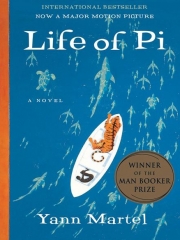Life of Pi by Yann Martel
Life of Pi is a bunch of classics blended together:
– Moby Dick, for its nautical setting and overly detailed descriptions of animals
– Catcher in the Rye, for its young protagonist in search of something
– Little Prince, for its domestication of wild animals
– Catch-22, for its banter
That said, it’s distinct and very much a classic on its own.
1) “That’s what fiction is about, isn’t it, the selective transforming of reality?”
Life is too real to not read fiction.
2) “Territories in the wild are large not as a matter of taste but of necessity. In a zoo, we do for animals what we have done for ourselves: we bring together in a small space what in the wild is spread out.”
Are we really doing animals a favor by satisfying all their needs in a confined space? Counter argument: Humans who have all they need in one place can’t seem to resist the urge to travel everywhere.
3) “I’ll be honest about it. It is not atheists who get stuck in my craw, but agnostics…. To choose doubt as a philosophy of life is akin to choosing immobility as a means of transportation.”
I’d argue that being agnostic is not choosing doubt.
4) “Socially inferior animals are the ones that make the most strenuous, resourceful efforts to get to know their keepers.”
Very interesting insight that the omega animals lowest on the social ladder are the stars of the show. Not sure if this is real, but it’s believable.
5) “Hindus, in their capacity for love, are indeed hairless Christians, just as Muslims, in the way they see God in everything, are bearded Hindus, and Christians, in their devotion to God, are hat-wearing Muslims.”
To my surprise, the first part of the story – before the survival saga – focuses a lot on religion. I especially enjoyed the Hindu dimension, which I don’t get often since most discussions in western literature focus on Christians, Jews, and Muslims.
6) “The camel at the zoo was unfazed, but that straw broke Father’s back.”
I loled.
7) “The dorado did a most extraordinary thing as it died: it began to flash all kinds of colours in rapid succession.”
Fish fact of the day. Also that dorados = mahi mahi.
8) “I will confess that I caught one of his arms with the gaff and used his flesh as bait. I will further confess that, driven by the extremity of my need and the madness to which it pushed me, I ate some of his flesh.”
Life of Pi was one of the more graphic/violent books I’ve read, which was a total surprise since I thought it was made into a kids movie.
9) “In this respect, the island was Gandhian: it resisted by not resisting. Every wave vanished into the island without a clash, with only a little frothing and foaming.”
The flesh-eating island was my favorite part of the journey. It was creepy and mysterious, and – in retrospect – a perfect metaphor for how dangerous it is to be complacent.
10) “‘Isn’t telling about something – using words, English or Japanese – already something of an invention? Isn’t just looking upon this world already something of an invention?'” – Pi
Yes – everything is subjective.
Pi’s journey on the lifeboat dragged on for too long, but writing this review has crystallized how much I enjoyed the book’s exploration of grand ideas. Most of all, the ending was gold. What’s real and what’s not? What’s a story and what’s life?
